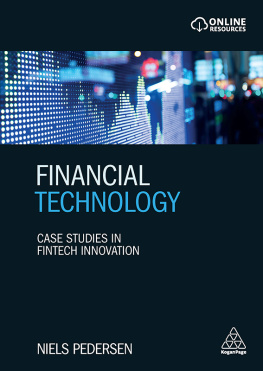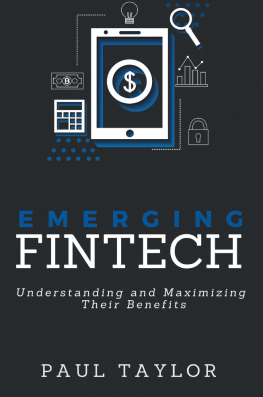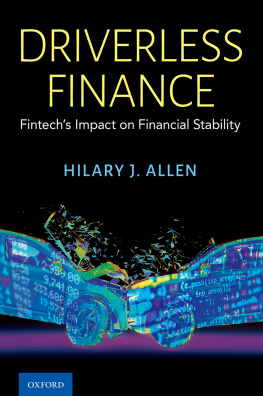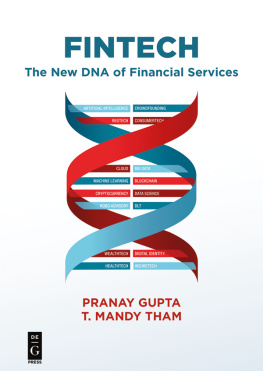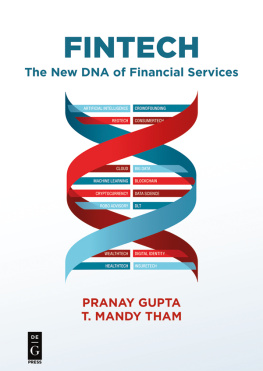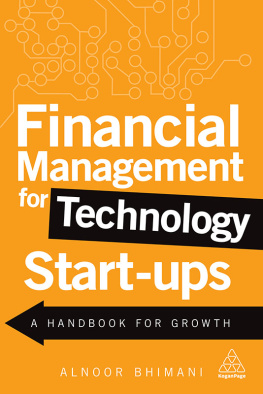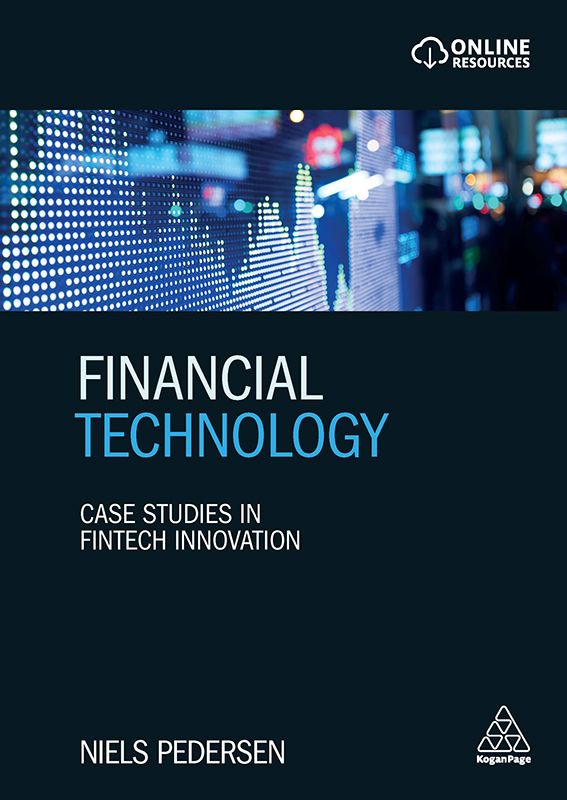
Contents
Landmarks
List of Figures
List of Tables
Page List
Praise for Financial Technology
If theres one book you need to read on fintech, this is it! Financial Technology is a must-read for anyone who wants a deep insight into this exciting industry.
Angela Yore, Co-Founder, SkyParlour
Financial Technology is a relevant, fresh and enlightening read for both seasoned finance veterans and those new to finance and fintech innovation. Niels Pedersens case studies are largely drawn from the US and the UK, but his takeaways and insights are equally applicable to South East Asia or in a global setting.
Erik Jonsson, Head of Digital Partnerships, Techcombank
Niels Pedersen accurately captures the key elements that contribute to innovation in the financial technology ecosystem, making this publication relevant to anyone who has an interest in the sector.
James Nurse, Managing Director, FINTRAIL
Whether you are an established brand or a new innovator, fintech holds the key to driving digital and financial inclusivity. Financial Technology summarizes the great and the good in the world of fintech, with case study material to help new entrants learn about best practice, as well as, most critically, taking a hard look at fintech business models so the next generation of fintech leaders can avoid the common pitfalls.
Neil Harris, Chairperson, The Inclusion Foundation
To Sophie, for her unwavering
support, and love
Contents
FIGURES
TABLES
Niels Pedersen is a senior lecturer on the MSc Financial Technology programme at Manchester Metropolitan University, UK, and a regular speaker on fintech. As a Chartered Accountant (ICAEW), he worked at PwC and the Financial Services Authority before coming to academia.
The traditional global banking and finance system was once viewed as the backbone of trade and industry. Such governed and centralized financial systems are based upon government-issued (fiat) currencies, where key agents in the system are agreed on the value of cash via stock and local exchanges fuelling transactions and controlling economies. The physical nature of exchange between key agents and brokers excluded the masses from direct participation. Instead, the retail banking segment employed financial managers and experts to offer a portfolio of services to customers in return for interest payments on, for instance, loans and mortgages, etc a distinct profit motive for the system. Over the centuries, this system monopolized the marketplace, presiding over consumer choic, underpinned by what could be described as a social contract of trust developed between the bank manager and consumer. This signifed a mutually productive relationship, packaged as safeguarding customers financial interests and personal data (hardcopy ledger) while making a profit.
Before the global financial crisis of 200709 (GFC), discussions of the incumbent banks dominant position and breaking of consumer trust would have been scorned for the lack of understanding surrounding the unique and socially embedded managerconsumer relationship. Since the GFC, we have seen a chain of events that gradually unpacked the macro-level centralized (and privileged) position of established financial institutions, revealing dubious trading practices with some reported reliance on underdeveloped algorithms making spurious transactions. In other words, failing to heed Ada Lovelaces warning: it [the algorithm] can only do whatever we know how to order it to perform. Enter the corporate rationalizers, introducing new technological innovations that challenge the extant system and its foundations, indeed, coining the term challenger banks. Such innovation began to upset the equilibrium of the financial system, opening a pathway to a new decentralized form of exchange that shifts from physical to digital exchange, declaring the rise of the now-familiar financial technology (fintech) sector.
Today, we live in the digital economy, of which fintech plays a significant role in presenting substantial socio-technological and transformational challenges from new terminology and skills emerging from computer/data science. This is driving a mounting degree of technological development in enabling consumers greater choice in their financial decisions. The COVID-19 pandemic has reportedly driven acceleration toward a rethinking of our physical transactions with cash, finance and banking to full digitization or a cashless society. Thus, the once-revered discussion with the bank manager has been usurped by a digital bot or assistant who can deftly answer those mundane questions about our bank balances or our likelihood of being granted a loan, for example. This socio-technical shift shows a reconceptualization of our social and physical relationship with finance to accessing online platforms. The power over our financial well-being and systems is moving away from larger financial institutions to that of the individual decentralizing financial control and promoting agility in choice. We have neo-banks, challenger banks and fintech start-ups disrupting the plethora of services that was once the sole proviso of the financial agents monopolizing access to banking and finance.
How are organizations responding to this transformation of financial services? Simply put, technological innovation and collaboration has arrived and is cited as key for retaining a competitive advantage. Those who choose not to collaborate and engage with this next industrial revolution risk inertia lacking agility in mindset and structure to adapt which could lead to exiting the marketplace. This is exemplified in the gradual closure of physical bank branches. The truth facing incumbents in banking and finance is: adapt, collaborate or die. Although they still retain customer mass over the new challengers, change is afoot.
Moreover, innovation invokes a myriad of digital regulations albeit some rules and governance are also undergoing digital transformation to maintain pace with fintech innovation to ensure consumers do not fall foul of malpractice back to Lovelaces warning around technology adoption. Yet, moving to a decentralized system is complex: finding a pathway through networks, APIs and new banking platforms (ie Open Banking platforms), and payments regulation. Thus, recognizing that buying off-the-shelf tech solutions without taking people into your network, organization or society with you may cause the profit motive to become unmoored. This is encapsulated in the first example of decentralized finance via distributed ledger technology underpinning blockchain and cryptocurrencies emerging since the GFC from the mysterious Satoshi Nakamoto. The limitations of a centralized system were writ large and the underpinning (almost hippy) central tenets focussed on changing the game of finance and decentralizing control over the system.
What has happened with decentralized finance since 2008 and what does this imply for organizations? As discussed, cultural and technical shifts of this magnitude necessitate time: as humans, we generally resist change that is forced rather than owned by us. Therefore, the current wave of innovation moves beyond disruption to signpost a new relationship with finance that will (eventually) benefit the masses. Admittedly, theres work to be done in this sphere, heralded by the Open Banking and finance movements.
Financial Technology provides an encyclopedic guide to the fintech arena. The use of topical examples helps garner an in-depth appreciation of fintech innovation while reducing fears of automation. The author embodies boundless thinking and agility tempered with caution over adoption, while celebrating technological innovation which should not be stifled but balanced by safeguarding individuals financial well-being. Thus, he addresses the need for financial inclusion across society, whereby ethical access and use of consumer data is central to creating trust in financial innovation, as consumers also adapt to the new digital financial landscape.
Next page
